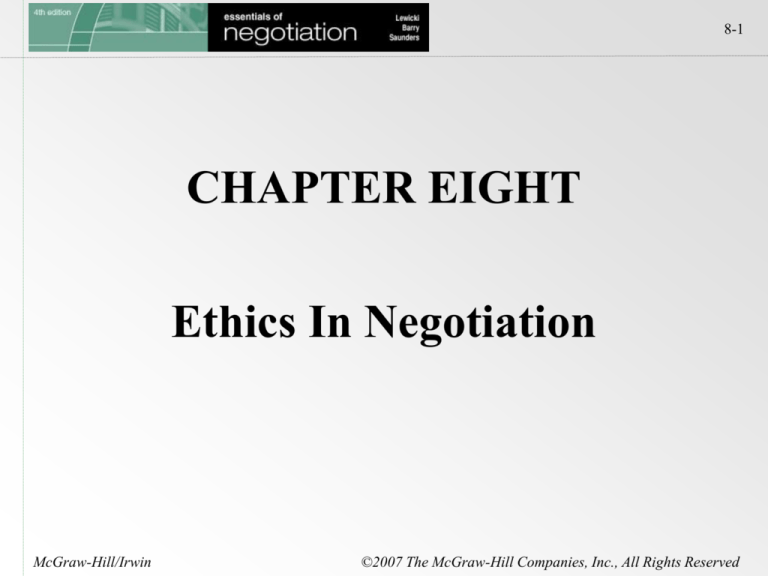
8-1
CHAPTER EIGHT
Ethics In Negotiation
McGraw-Hill/Irwin
©2007 The McGraw-Hill Companies, Inc., All Rights Reserved
8-2
What Do We Mean by Ethics and
Why Do They Matter in Negotiation?
Ethics:
• Are broadly applied social standards for what is right
or wrong in a particular situation, or a process for
setting those standards
• Grow out of particular philosophies which
– Define the nature of the world in which we live
– Prescribe rules for living together
McGraw-Hill/Irwin
©2007 The McGraw-Hill Companies, Inc., All Rights Reserved
8-3
Resolving Moral Problems
McGraw-Hill/Irwin
©2007 The McGraw-Hill Companies, Inc., All Rights Reserved
8-4
Four Approaches
to Ethical Reasoning
• End-result ethics
– The rightness of an action is determined by
evaluating its consequences
• Duty ethics
– The rightness of an action is determined by one’s
obligation to adhere to consistent principles, laws
and social standards that define what is right and
wrong
McGraw-Hill/Irwin
©2007 The McGraw-Hill Companies, Inc., All Rights Reserved
8-5
Four Approaches
to Ethical Reasoning
• Social contract ethics
– The rightness of an action is based on the customs
and norms of a particular society or community
• Personalistic ethics
– The rightness of the action is based on one’s own
conscience and moral standards
McGraw-Hill/Irwin
©2007 The McGraw-Hill Companies, Inc., All Rights Reserved
8-6
Questions of Ethical Conduct
that Arise in Negotiation
• Using ethically ambiguous tactics: It’s
(mostly) all about the truth
• Identifying ethically ambiguous tactics and
attitudes toward their use
– What ethically ambiguous tactics are there?
– Does tolerance for ethically ambiguous tactics lead
to their actual use?
– Is it okay to use ethically ambiguous tactics?
McGraw-Hill/Irwin
©2007 The McGraw-Hill Companies, Inc., All Rights Reserved
8-7
Questions of Ethical Conduct
that Arise in Negotiation
• Deception by omission versus commission
– Omission – failing to disclose information that would
benefit the other
– Commission – actually lying about the common-value issue
• The decision to use ethically ambiguous tactics: A
model
McGraw-Hill/Irwin
©2007 The McGraw-Hill Companies, Inc., All Rights Reserved
8-8
Categories of Marginally Ethical
Negotiating Tactics
McGraw-Hill/Irwin
©2007 The McGraw-Hill Companies, Inc., All Rights Reserved
8-9
Why Use Deceptive Tactics?
Motives and Consequences
• The power motive
– The purpose of using ethically ambiguous negotiating
tactics is to increase the negotiator’s power in the
bargaining environment
• Other motives to behave unethically
– Negotiators are more likely to see ethically ambiguous
tactics as appropriate if they anticipate that the other’s
expected motivation would be more competitive
McGraw-Hill/Irwin
©2007 The McGraw-Hill Companies, Inc., All Rights Reserved
8-10
Model of Ethical Decision Making
McGraw-Hill/Irwin
©2007 The McGraw-Hill Companies, Inc., All Rights Reserved
8-11
The Consequences of
Unethical Conduct
A negotiator who employs an unethical tactic will
experience positive or negative consequences. The
consequences are based on:
• Effectiveness – whether the tactic is effective
• Reactions of others – how the other person, constituencies, and
audiences evaluate the tactic
• Reactions of self – how the negotiator evaluates the tactic,
feels about using the tactic
McGraw-Hill/Irwin
©2007 The McGraw-Hill Companies, Inc., All Rights Reserved
8-12
Explanations and Justifications
The primary purpose of explanations and
justifications is:
– To rationalize, explain, or excuse the
behavior
– To verbalize some good, legitimate
reason why this tactic was necessary
McGraw-Hill/Irwin
©2007 The McGraw-Hill Companies, Inc., All Rights Reserved
8-13
Rationalizations for
Unethical Conduct
•
•
•
•
The tactic was unavoidable
The tactic was harmless
The tactic will help to avoid negative consequences
The tactic will produce good consequences, or the
tactic is altruistically motivated
• “They had it coming,” or “They deserve it,” or “I’m
just getting my due”
McGraw-Hill/Irwin
©2007 The McGraw-Hill Companies, Inc., All Rights Reserved
8-14
Rationalizations for
Unethical Conduct
• “They were going to do it anyway, so I will do it
first”
• “He started it”
• The tactic is fair or appropriate to the situation
McGraw-Hill/Irwin
©2007 The McGraw-Hill Companies, Inc., All Rights Reserved
8-15
How Can Negotiators Deal With the
Other Party’s Use of Deception?
•
•
•
•
Ask probing questions
Force the other party to lie or back off
“Call” the tactic
Discuss what you see and offer to help the
other party change to more honest behaviors
• Respond in kind
• Ignore the tactic
McGraw-Hill/Irwin
©2007 The McGraw-Hill Companies, Inc., All Rights Reserved





